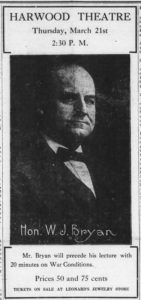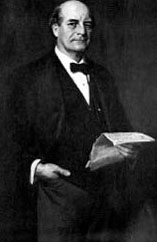At the end of February, 1918, the local newspapers announced that William Jennings Bryan would be speaking at the Harwood (Palace) Theater in Kinsley on March 21. If his name sounds familiar, it may be because he ran on the Democratic ticket for the presidency three times, losing twice to William McKinley in 1896 and 1900 and once to William Howard Taft in 1908. As hard as it is to lose, these candidacies did give Bryan 100% name recognition, and along with his talent as a powerful orator, he would become the most popular speaker on the Chautauqua circuit for 25 years. He was paid for delivering thousands of speeches in hundreds of towns and cities across the country.
As hard as it is to lose, these candidacies did give Bryan 100% name recognition, and along with his talent as a powerful orator, he would become the most popular speaker on the Chautauqua circuit for 25 years. He was paid for delivering thousands of speeches in hundreds of towns and cities across the country.
Bryan campaigned for Woodrow Wilson in the election of 1912. Wilson rewarded him by appointing him Secretary of State. For the next two years he negotiated 28 treaties trying to arbitrate disputes before WWI broke out. He made several unsuccessful attempts to negotiate a treaty with Germany.
After the Lusitania was torpedoed by a German submarine on May 7, 1915, Wilson made strong demands on Germany that Bryan disagreed with because he hoped that the U.S. would avoid entering WWI. This disagreement led Bryan to resign from office on June 9, 1915. Despite their differences, Bryan campaigned as a private citizen for Wilson’s reelection in 1916. He spoke at the Chautauqua in Kinsley on August 31, 1916.
When war was declared in April 1917, Bryan wrote Wilson, “Believing it to be the duty of the citizen to bear his part of the burden of war and his share of the peril, I hereby tender my services to the Government. Please enroll me as a private whenever I am needed and assign me to any work that I can do.” Wilson, however, did not allow the 57-year-old Bryan to rejoin the military, and did not offer him any wartime role.
The Kinsley Graphic reported on March 28, 1918 that very few people attended Bryan’s speech advertised above.
“The Bryan meeting last Thursday might be considered a frost, in the light of the past, when Bryan’s name has caused crowds to gather to hear him. The Palace Theatre was only about half filled. The people still resent the fact that he resigned from the cabinet and later exerted his powerful influence to keep this country from entering the war. As a matter of fact, it is hardly right to view Mr. Bryan’s course with present-day criticism. He was frankly against the war until it was accepted by this nation. Then he immediately offered his services to the president in any capacity where the president thought he could be of the greatest service. Mr. Wilson told him that he could best serve his country by lecturing and making talks in support of the government’s position in this war, and that is what he is doing.”
William Jennings Bryan remained an active orator and advocated for the enactment of Prohibition. He most famously opposed Darwinism on religious and humanitarian grounds at the Scopes “Monkey” Trial in 1925 in Tennessee. As the prosecutor he argued for fundamental Christianity beliefs against the famed defense attorney, Clarence Darrow, who argued for modern science, evolution and Darwinism. Bryan died 5 days after he won the Scopes trial.
If you are able to attend a movie or visit the historic Palace Theater in Kinsley, take a minute to imagine what it would have been like to sit in the audience and listen to this famous orator’s powerful voice one hundred years ago.

CLICK HERE to listen and read Bryan’s most famous “Cross of Gold” speech delivered at the National Democratic Convention in 1896 in Chicago.
